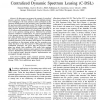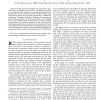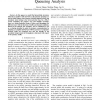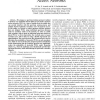117
click to vote
JSAC
2011
14 years 8 months ago
2011
— In cognitive radio networks (CRNs), effective and efficient channel exploitation is imperative for unlicensed secondary users to seize available network resources and improve ...
129
click to vote
TWC
2010
14 years 8 months ago
2010
In this paper, we propose the concept of centralized dynamic spectrum leasing (C-DSL), in which multiple primary users belonging to the same primary system participate in the spect...
135
click to vote
TWC
2010
14 years 8 months ago
2010
In this paper, optimal multi-channel cooperative sensing strategies in cognitive radio networks are investigated. A cognitive radio network with multiple potential channels is cons...
110
click to vote
TWC
2010
14 years 8 months ago
2010
Abstract--We propose a cognitive radio system in fading environments where the secondary sender opportunistically violates the secondary-to-primary (S-P) interference power limit. ...
110
click to vote
TWC
2010
14 years 8 months ago
2010
Abstract--In this paper we investigate the opportunistic spectrum access in temporal domain where a secondary user shares a radio channel with a primary user during the OFF period ...
153
click to vote
TSP
2010
14 years 8 months ago
2010
We consider decentralized multiantenna cognitive radio networks where the secondary (cognitive) users are granted simultaneous spectrum access along with the license-holding (prima...
140
click to vote
ICC
2009
IEEE
14 years 12 months ago
2009
IEEE
In this paper, we model the hierarchical structures inherent in cognitive radio networks as the priority queueing system in which primary users interact with the highest priority a...
146
click to vote
GLOBECOM
2009
IEEE
14 years 12 months ago
2009
IEEE
Primary user emulation attack in multichannel cognitive radio systems is discussed. An attacker is assumed to be able to send primary-user-like signals during spectrum sensing peri...
148
click to vote
GLOBECOM
2010
IEEE
15 years 2 days ago
2010
IEEE
In a cognitive radio network, the full-spectrum is usually divided into multiple channels. However, due to the hardware and energy constraints, a cognitive user (also called second...
142
click to vote
GLOBECOM
2010
IEEE
15 years 2 days ago
2010
IEEE
We propose a spectrum decision protocol resilient to primary user emulation attacks (PUEA) in dynamic spectrum access networks. PUEA is a type of denial-of-service attack that can ...





